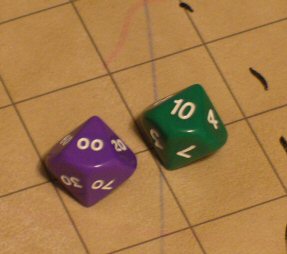But I really like also looking at dice as a tool, a piece of technology. In that vein here are two of the niftier dice in my collection:
 The purple d10 marked 00 through 90 makes rolling percentiles a snap. You never have to remember to indicate which die is the tens die. And it discourages cheating by some of the more morally challenged players. I believe Lou Zocchi's company Gamescience first came out with this kind of die. They called it the deckaider. Lou Zocchi's influence upon gaming is probably vastly underestimated these days. As I understand it he was a major distributor in the early days of the hobby, as well as the source for the best dice. I've seen Zocchi credited with inventing the original d10 as well. Before he came along everybody used d20's marked 0 to 9 twice. I know a few of my readers work in the game industry. If you've got any good info on Mr. Zocchi I'd love to hear from you in the comments.
The purple d10 marked 00 through 90 makes rolling percentiles a snap. You never have to remember to indicate which die is the tens die. And it discourages cheating by some of the more morally challenged players. I believe Lou Zocchi's company Gamescience first came out with this kind of die. They called it the deckaider. Lou Zocchi's influence upon gaming is probably vastly underestimated these days. As I understand it he was a major distributor in the early days of the hobby, as well as the source for the best dice. I've seen Zocchi credited with inventing the original d10 as well. Before he came along everybody used d20's marked 0 to 9 twice. I know a few of my readers work in the game industry. If you've got any good info on Mr. Zocchi I'd love to hear from you in the comments.The green die is the new d10 that you can get in some Hasbro/Wizards products. I think mine came from a D&D Basic set. Not the new one with the cool blue dragon. I still need to get one of those. Mine is from the immediately prior version. I love this die because it actually has the number ten on it. All my other d10's are marked zero to nine. (Well, except for these goofy Werewolf: The Whatever dice that have claw symbols on them. I got them free at a con.) Teaching newbies that zero means ten is an unnecessary pain in the butt. Wizards' new d10 eliminates that part of the learning process.
Neither new ten-sider does anything to elminate the '00' problem. A roll of one hundred is still represented in a way that is both counterintuitive and different from every other result that percentile dice can generate. For a further look at this issue, I recommend this old Critical Miss article.








No comments:
Post a Comment